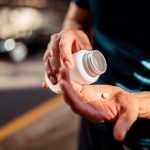From plugs on podcasts to sponsored content for online stores – many people claim that the synthetic peptide BPC-157 has helped with gut health and healing injury, but does the science stack up? Here’s what you need to know about BPC-157 and how it could affect your health.
What is BPC 157?
BPC 157 (Body Protection Compound 157) is a synthetic peptide derived from a protein found in the human stomach. It’s also known as Pentadecapeptide, PLD-116, PL-10, PL14736 and Bepecin.
What are peptides?
A peptide is a short chain of amino acids, kind of like a smaller version of proteins, which are in every cell of our bodies and are responsible for our bodies’ structure and function. Some of your body’s cells create peptides that work like hormones, helping with processes like as boosting the immune system, helping the body grow and repair itself and managing how we use energy. Some peptides are really good at helping muscles grow, and there are synthetic (made in a laboratory) versions that work in a similar way. The GLP1 receptor antagonist drug semaglutide (Ozempic/Wegovy) is a synthetic peptide. Some peptides have become increasingly popular amongst professional and amateur athletes, bodybuilders and gymgoers, without strong evidence of advantages or even safety. Learn more about peptides here.
What are the benefits of BPC 157?
Websites selling these products claim BPC-157 can be injected or taken orally for bone and joint healing, helping stomach ulcers and increasing athletic performance, and there are plenty of people who share their success stories. While these anecdotes can be pretty convincing for some people, they’re not supported by any scientific evidence. In fact, the US Anti-Doping Authority says there is a concerning lack of published clinical trial data because studies appear to have been cancelled or stopped without any published conclusions.
One of the few published studies of BP-157 involving humans was a very small, low-quality study with 16 participants with knee pain. It found that 12 participants who received BPC 157 injections in their knees rated their pain lower six months to a year later. However, there were no specific tools used to measure these improvements. Many of this study’s subjects also had ligament sprains and tendon issues, which often heal on their own over time, so it’s unclear if these improvements were due to the peptide or just the passage of time (the study had no control group). Importantly, this report was authored by health practitioners affiliated with a clinic selling BPC-157 injections, so there’s a clear conflict of interest.
Studies on rodents and cells have been used to suggest that BPC-157 might help heal tissues like tendons, joints, nerves, the intestinal tract, stomach and skin, but these haven’t been supported by studies in humans.
What are the side effects of BPC 157?
The biggest drawback of BPC-157 is that there is not enough evidence of its safety.
Injecting can also come with risks like pain and swelling at the injection site, infection or allergic reaction.
It might be easy to buy peptides online but that doesn’t make them safe. Doses and ingredients could be different to what’s on the label, and they could be contaminated with all sorts of dangerous things.
Is BPC 157 banned in Australia or is it legal?
BPC-157 is not approved by the Therapeutic Goods Administration (TGA) and is prohibited by the World Anti-Doping Agency (WADA).
When sold online BPC157 is often described as ‘experimental’ or ‘for research only’ but it is a Schedule 4 prescription-only medicine in Australia making it is illegal to possess without a valid prescription.















